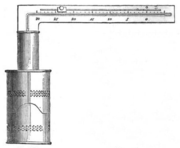
Ebullioscope
Encyclopedia

Boiling point
The boiling point of an element or a substance is the temperature at which the vapor pressure of the liquid equals the environmental pressure surrounding the liquid....
of a liquid. This can be used for determining the alcoholic strength of a mixture, or for determining the molecular weight of a non-volatile solute based on the boiling-point elevation
Boiling-point elevation
Boiling-point elevation describes the phenomenon that the boiling point of a liquid will be higher when another compound is added, meaning that a solution has a higher boiling point than a pure solvent. This happens whenever a non-volatile solute, such as a salt, is added to a pure solvent, such...
. The procedure is known as ebullioscopy.
The first ebullioscope was invented in 1838 by Brossard-Vidal, and was used for measuring alcoholic content. The advantage of this method was that the boiling point is relatively insensitive to other components such as sugars. Older alcoholimeters were based on measuring the density, which is more sensitive to the presence of other solutes.
A later version was built by the French chemist François-Marie Raoult
François-Marie Raoult
François-Marie Raoult was a French chemist who conducted research into the behavior of solutions, especially their physical properties.- Life and work :Raoult was born at Fournes, in the département of Nord...
, but the difficulty to determine the exact temperature was overcome by the invention of the Beckmann thermometer
Beckmann thermometer
A Beckmann thermometer is a device used to measure small differences of temperature, but not absolute temperature values. It was invented by Ernst Otto Beckmann , a German chemist, for his measurements of colligative properties in 1905...
by Ernst Otto Beckmann
Ernst Otto Beckmann
Ernst Otto Beckmann was a German chemist who is remembered for his invention of the Beckmann differential thermometer and for his discovery of the Beckmann rearrangement.-Scientific work:...
in 1887. This improvement made the ebullioscope a standard apparatus to determine the molecular weight of substances in solution by using the ebullioscopic constant
Ebullioscopic constant
In thermodynamics, the ebullioscopic constant, Kb, allows one to relate molality to boiling point elevation. It is the ratio of the latter to the former:\Delta T = i\cdot K_b \cdot mi is the Vant Hoff factor...
of the solvent.

